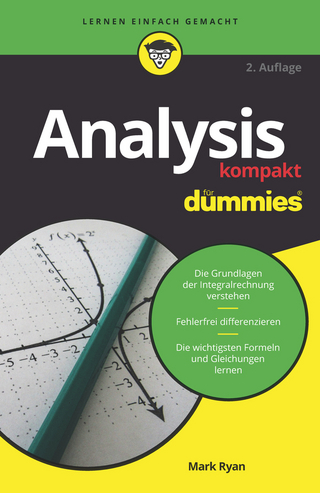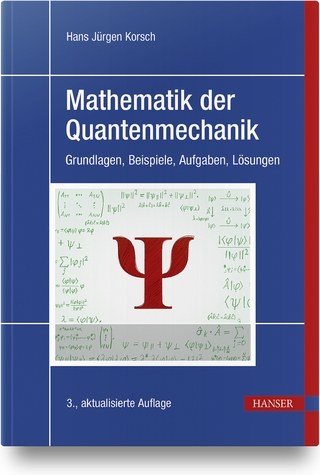
Thomas' Calculus Early Transcendentals
Pearson (Verlag)
978-0-321-63632-4 (ISBN)
- Titel erscheint in neuer Auflage
- Artikel merken
Calculus hasn’t changed, but your students have. Today’s students have been raised on immediacy and the desire for relevance, and they come to calculus with varied mathematical backgrounds. Thomas’ Calculus: Early Transcendentals, Twelfth Edition, helps your students successfully generalize and apply the key ideas of calculus through clear and precise explanations, clean design, thoughtfully chosen examples, and superior exercise sets. Thomas offers the right mix of basic, conceptual, and challenging exercises, along with meaningful applications. This significant revision features more examples, more mid-level exercises, more figures, and improved conceptual flow.
This is the full version of the text contains Chapters 1-16. ISBN-10:0321628837 | ISBN-13:9780321628831 Thomas Calculus Early Transcendentals, Single Variable) contains Chapters 1-11. The Multivariable version of the text contains Chapters 11-16. MyMathLab access is not included with this ISBN.
Joel Hass received his PhD from the University of California—Berkeley. He is currently a professor of mathematics at the University of California—Davis. He has coauthored six widely used calculus texts as well as two calculus study guides. He is currently on the editorial board of Geometriae Dedicata and Media-Enhanced Mathematics. He has been a member of the Institute for Advanced Study at Princeton University and of the Mathematical Sciences Research Institute, and he was a Sloan Research Fellow. Hass’s current areas of research include the geometry of proteins, three dimensional manifolds, applied math, and computational complexity. In his free time, Hass enjoys kayaking. Maurice D. Weir holds a DA and MS from Carnegie-Mellon University and received his BS at Whitman College. He is a Professor Emeritus of the Department of Applied Mathematics at the Naval Postgraduate School in Monterey, California. Weir enjoys teaching Mathematical Modeling and Differential Equations. His current areas of research include modeling and simulation as well as mathematics education. Weir has been awarded the Outstanding Civilian Service Medal, the Superior Civilian Service Award, and the Schieffelin Award for Excellence in Teaching. He has coauthored eight books, including the University Calculus series and the twelfth edition of Thomas’ Calculus. George B. Thomas, Jr. (late) of the Massachusetts Institute of Technology, was a professor of mathematics for thirty-eight years; he served as the executive officer of the department for ten years and as graduate registration officer for five years. Thomas held a spot on the board of governors of the Mathematical Association of America and on the executive committee of the mathematics division of the American Society for Engineering Education. His book, Calculus and Analytic Geometry, was first published in 1951 and has since gone through multiple revisions. The text is now in its twelfth edition and continues to guide students through their calculus courses. He also co-authored monographs on mathematics, including the text Probability and Statistics.
1. Functions
1.1 Functions and Their Graphs
1.2 Combining Functions; Shifting and Scaling Graphs
1.3 Trigonometric Functions
1.4 Graphing with Calculators and Computers
1.5 Exponential Functions
1.6 Inverse Functions and Logarithms
2. Limits and Derivatives
2.1 Rates of Change and Tangents to Curves
2.2 Limit of a Function and Limit Laws
2.3 Precise Definition of a Limit
2.4 One-Sided Limits
2.5 Continuity
2.6 Limits Involving Infinity, Asymptotes of Graphs
3. Differentiation
3.1 Tangents and the Derivative at a Point
3.2 The Derivative as a Function
3.3 Rules for Polynomials, Exponentials, Products, and Quotients
3.4 The Derivative as a Rate of Change
3.5 Derivatives of Trigonometric Functions
3.6 The Chain Rule
3.7 Implicit Differentiation
3.8 Derivatives of Inverse Functions and Logarithms
3.9 Inverse Trigonometric Functions
3.10 Related Rates
3.11 Linearization and Differentials
4. Applications of Derivatives
4.1 Extreme Values of Functions
4.2 The Mean Value Theorem
4.3 Monotonic Functions and the First Derivative Test
4.4 Concavity and Curve Sketching
4.5 Indeterminate Forms and L'Hopital's Rule
4.6 Applied Optimization
4.7 Newton's Method
4.8 Antiderivatives
5. Integration
5.1 Area and Estimating with Finite Sums
5.2 Sigma Notation and Limits of Finite Sums
5.3 The Definite Integral
5.4 The Fundamental Theorem of Calculus
5.5 Indefinite Integrals and the Substitution Rule
5.6 Substitution and Area Between Curves
6. Applications of Definite Integrals
6.1 Volumes Using Cross-Sections
6.2 Volumes Using Cylindrical Shells
6.3 Arc Length
6.4 Areas of Surfaces of Revolution
6.5 Work and Fluid Forces
6.6 Moments and Centers of Mass
7. Integrals and Transcendental Functions
7.1 The Logarithm Defined as an Integral
7.2 Exponential Change and Separable Differential Equations
7.3 Hyperbolic Functions
7.4 Relative Rates of Growth
8. Techniques of Integration
8.1 Integration by Parts
8.2 Trigonometric Integrals
8.3 Trigonometric Substitutions
8.4 Integration of Rational Functions by Partial Fractions
8.5 Integral Tables and Computer Algebra Systems
8.6 Numerical Integration
8.7 Improper Integrals
9. First-Order Differential Equations
9.1 Solutions, Slope Fields, and Euler's Method
9.2 First-Order Linear Equations
9.3 Applications
9.4 Graphical Solutions of Autonomous Equations
9.5 Systems of Equations and Phase Planes
10. Infinite Sequences and Series
10.1 Sequences
10.2 Infinite Series
10.3 The Integral Test
10.4 Comparison Tests
10.5 The Ratio and Root Tests
10.6 Alternating Series, Absolute and Conditional Convergence
10.7 Power Series
10.8 Taylor and Maclaurin Series
10.9 Convergence of Taylor Series
10.10 The Binomial Series and Applications of Taylor Series
11. Parametric Equations and Polar Coordinates
11.1 Parametrizations of Plane Curves
11.2 Calculus with Parametric Curves
11.3 Polar Coordinates
11.4 Graphing in Polar Coordinates
11.5 Areas and Lengths in Polar Coordinates
11.6 Conic Sections
11.7 Conics in Polar Coordinates
12. Vectors and the Geometry of Space
12.1 Three-Dimensional Coordinate Systems
12.2 Vectors
12.3 The Dot Product
12.4 The Cross Product
12.5 Lines and Planes in Space
12.6 Cylinders and Quadric Surfaces
13. Vector-Valued Functions and Motion in Space
13.1 Curves in Space and Their Tangents
13.2 Integrals of Vector Functions; Projectile Motion
13.3 Arc Length in Space
13.4 Curvature and Normal Vectors of a Curve
13.5 Tangential and Normal Components of Acceleration
13.6 Velocity and Acceleration in Polar Coordinates
14. Partial Derivatives
14.1 Functions of Several Variables
14.2 Limits and Continuity in Higher Dimensions
14.3 Partial Derivatives
14.4 The Chain Rule
14.5 Directional Derivatives and Gradient Vectors
14.6 Tangent Planes and Differentials
14.7 Extreme Values and Saddle Points
14.8 Lagrange Multipliers
14.9 Taylor's Formula for Two Variables
14.10 Partial Derivatives with Constrained Variables
15. Multiple Integrals
15.1 Double and Iterated Integrals over Rectangles
15.2 Double Integrals over General Regions
15.3 Area by Double Integration
15.4 Double Integrals in Polar Form
15.5 Triple Integrals in Rectangular Coordinates
15.6 Moments and Centers of Mass
15.7 Triple Integrals in Cylindrical and Spherical Coordinates
15.8 Substitutions in Multiple Integrals
16. Integration in Vector Fields
16.1 Line Integrals
16.2 Vector Fields and Line Integrals: Work, Circulation, and Flux
16.3 Path Independence, Conservative Fields, and Potential Functions
16.4 Green's Theorem in the Plane
16.5 Surfaces and Area
16.6 Surface Integrals
16.7 Stokes' Theorem
16.8 The Divergence Theorem and a Unified Theory
17. Second-Order Differential Equations (online)
17.1 Second-Order Linear Equations
17.2 Nonhomogeneous Linear Equations
17.3 Applications
17.4 Euler Equations
17.5 Power-Series Solutions
Appendices
1. Real Numbers and the Real Line
2. Mathematical Induction
3. Lines, Circles, and Parabolas
4. Proofs of Limit Theorems
5. Commonly Occurring Limits
6. Theory of the Real Numbers
7. Complex Numbers
8. The Distributive Law for Vector Cross Products
9. The Mixed Derivative Theorem and the Increment Theorem
| Erscheint lt. Verlag | 7.1.2010 |
|---|---|
| Sprache | englisch |
| Maße | 216 x 274 mm |
| Gewicht | 2340 g |
| Themenwelt | Mathematik / Informatik ► Mathematik ► Analysis |
| ISBN-10 | 0-321-63632-5 / 0321636325 |
| ISBN-13 | 978-0-321-63632-4 / 9780321636324 |
| Zustand | Neuware |
| Haben Sie eine Frage zum Produkt? |
aus dem Bereich



